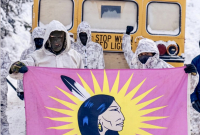Support strong Canadian climate journalism for 2025
Wet’suwet’en land defenders are in a battle with the B.C. government over future development of the oil and gas industry within their unceded territories. They want to protect their ancestral lands, water and traditional practices from the intrusion of industrial development.
On the other hand, our federal and provincial governments offer massive financial incentives to encourage fossil fuel companies to increase the extraction and sale of natural gas.
In Canada, burning fossil fuels accounts for 74 per cent of total greenhouse gas emissions. Yet the B.C. government says we can tackle climate change at the same time as we ramp up our fossil fuel industry.
This seems like pure cognitive dissonance.
At COP26, more than 100 countries pledged to decrease methane production by 30 per cent by 2030. And yet B.C. and Canada are providing hundreds of millions of dollars in incentives to companies to increase methane production.
Hundreds of people in B.C. died from the heat dome in June and the landslides in November. According to climatologists, these events are closely linked to climate change. We owe it to their memories to try to prevent future similar events.
Both British Columbia and Canada have signed on to the United Nations Declaration of the Rights of Indigenous Peoples (UNDRIP). Yet excessive force continues to be used to repress Indigenous populations when they try to protect their land from industrial development.
The Unist’ot’en, a house group of the Wet’suwet’en, said in a press release: “The proposed pipelines are a threat to the watershed, as well as the plants, animals and communities that depend on them. The Unist’ot’en are fighting for the future health of the land. They are protecting the traditional hunting, trapping, and fishing territories to ensure that the natural beauty and bounty of the earth will be enjoyed for generations to come.”
They are particularly distressed and angered by planned pipeline construction beneath the most important river running through their territory — a river whose waters are still pristine enough to drink.
Sleydo’, spokesperson for the Gidimt’en, one of five clans of the Wet’suwet’en, has described the river like this: “Wedzin Kwa is our sacred headwaters that feeds all of the Nations downstream. All of our future generations rely on the salmon, the animals, and the water that runs from our sacred headwaters.”
The Wet’suwet’en still have access to a pure, clean water supply, unlike so many other Indigenous Nations. Why risk adding them to the list of those burdened with boil water advisories?
Of special concern to us as physicians is the status of the Unist’ot’en Healing Centre. Dr. Karla Tait, director of clinical programming for the centre, has noted: “We saw the healing lodge as an opportunity to expand and offer this to our community members. We envision holding healing camps there. It is a chance to return to … land-based wellness practices of our ancestors.”
Invasive large-scale industrial development on nearby lands is clearly incompatible with the work of the healing centre.
Freda Huson (Chief Howihkat) a Unist’ot’en hereditary leader who founded the healing centre in 2010, recently won the Right Livelihood Award — the “alternate Nobel Prize” — for her “fearless dedication to reclaiming her people’s culture and defending their land against disastrous pipeline projects.” In her words: “The land is not separate from us. The land sustains us. And if we don’t take care of her, she won’t be able to sustain us, and we as a generation of people will die.”
The Supreme Court of Canada in Delgamuukw v. British Columbia concluded “the provincial government has no right to extinguish the Indigenous peoples’ rights to their ancestral territories.”
If our commitment to UNDRIP is real and not simply cosmetic, then there must be a radical change in government behaviour.
People across Canada have been distressed to see the RCMP raid the Gidimt’en camps — more than once — with assault rifles and police dogs.
Canada’s Constitution is predicated on “Peace, order and good government.” Are we really applying this framework to our treatment of the Wet’suwet’en?
Wet’suwet’en members were carted off to jail for simply wanting to live in harmony with nature. Several reporters covering the story were also taken to jail. Conduct like this is more typical of a military dictatorship than of a democratic country like Canada.
The United Nations Committee on the Elimination of Racial Discrimination began calling on Canada to withdraw police and security forces from traditional lands in 2019. It specifically asked the government to stop construction of the Coastal GasLink pipeline until it receives free, prior and informed consent from all affected First Nations.
Our country is truly at a crossroads. Decisions being made now will shape Canada’s reputation for many years to come. In this critical time, we ask our leaders to think carefully about their role in history.
Dr. Larry Barzelai, Dr. Warren Bell, and Dr. Melissa Lem are B.C. family physicians and members of the Canadian Association of Physicians for the Environment (CAPE).








Comments
I live in BC and have no indigenous ancestors but I strongly support them in their fight to stop this pipeline. How can the NDP hold two radically opposite beliefs? They are becoming an oxymoron political party and I am very disappointed in them. Someone needs to have the guts to bite the bullet and stop encouraging fossil fuel companies. We need something new! Maybe it is someone new.
well said. shame on BCGov. shame on federal NDP for not intervening. Thousands of Ndp members across Canada have written or spoken on the phone with ndp fundraisers saying “ no money to you till you stop the CGL and get RCMP off Wet'suet'en territory. “ ( we sure did)
good news is it has created a stir in the party, though still no clear principled stand by Singh . POLITICAL GUTS needed big time here.
I oscillate between despair that NDP are as corporate-compromised and devoid of vision as the other parties, and admiration at the resolve, wisdom and courage of all land defenders and allies. Suburban moms with kids in strollers blocking rail lines in Toronto for land defenders in northern BC. must strike terror into the fossil bosses, ‘cause you cant arrest thousands of those folks… and they will have to if this blows up again. we aren't through this yet Canada!!!!
perhaps Mark Miller is the person who has seen the way forward?
During the winter of 2020 , there was a nation wide railroad blockade in support of the Wet’suwet’en. It caused a lot of disruption, but it forced Big Oil and the governments to back off. But their objectives is still to oust the indigenous land defenders to built pipelines whose objectives is to produce more fossil fuels! Just before de pandemic struck, I wrote the following text in support of reconciliation between the 3 solitudes (a reference to Hugh MacLennan)
https://www.rvhq.ca/three-solitudes/
Bravo! Well stated, so accurate and true. Encore! Encore!
TELL THE TRUTH!....BE THE CHANGE!......EVERY CHILD MATTERS!
One in five houses against translates as 4 in 5 in favour. Plus the elected band councils.
One wonders when, if ever, the green warriors will stop exploiting indigenous issues and argue their case on a rational basis?
It's a toss up as to which group is the most irrational, for example, remote indigenous communities claim to be 'at one with the land' in one breath and demand that the federal government deliver all mod cons to their remote reserves in the other, while condemning those of us who might manufacture the means for those mod cons for despoiling the landscape. Go figure.
One in five houses against would indeed translate as 4 in 5 . . . well, at least neutral. But I'm not seeing any information here confirming such an analysis--the article has ONE data point, the fact that one house issued a press release. That tells us nothing about what the other houses think; jumping to the conclusion that they must be in favour of a pipeline seems like rather a distant leap.
I have seen in other articles claims that seem reliable, about the hereditary chiefs--I can't remember if they were all against the pipeline, or all but one. As to the band councils, they don't have jurisdiction. I'm not a fan of hereditary government, but it's not my business, and saying it's OK to ignore them because the band councils think different is like saying it's OK to ignore the Premier of BC's opinion about something happening in the interior if you've got the Mayor of Vancouver's approval. Doesn't matter if you like the Mayor of Vancouver better than the Premier of BC, he doesn't govern anything outside Vancouver.
When a community is just a few thousand people, "they have no jurisdiction" is pretty dismissive. We normally have respect for "The People", being a democratic country. It's been pointed out that these band councils have been re-elected multiple times now, after making agreements with Coastal Gaslink that the objectors are simply dismissing. Clearly, the Wet'suwet'en population were not that angry with the band councils that made agreements.
The leader of the PAC at a nearby school thinks pizza and ice-cream days are the perfect reward for kids getting permission papers signed by parents. The same gal gets re-elected year after year. That doesn't mean the parents want their kids' faces stuffed with pizza and ice-cream at school. Especially those whose kids are allergic.
But that's not what her thinking is about.
"Yet the B.C. government says we can tackle climate change at the same time as we ramp up our fossil fuel industry.
"This seems like pure cognitive dissonance.
No, it seems like lying.
Lying to ourselves and others is what we do to reduce cognitive dissonance — the mental discomfort that results from holding conflicting beliefs, values, or attitudes.
Sociopaths do not suffer so much from cognitive dissonance.
Sociopathic politicians propagate lie to manufacture consent for their destructive policies, stifle public protest, keep voters onside, and retain power.
Fossil-fuel CEOs and the industry-captured politicians in their pocket — Horgan, Notley, Trudeau, Wilkinson, & Co. — simply don't care. They don't care about you. They don't care about their grandchildren or yours. They don't care about the future. They don't care about science. They don't care about facts.
Disconnected from nature and detached from reality.
Amen to that Geoffrey!